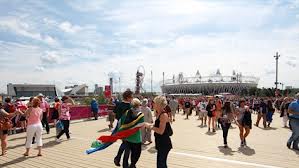Like many others, I have been totally blown away by the success of the London Olympic and Paralympic Games these past few weeks. It’s
as if a huge and unaccustomed wave of positivity has engulfed us and changed our lives, at least temporarily. The question is, are we going to go back to being the same old Britain at the end of it, or are we going to see permanent changes?
I believe that there is a huge amount that businesses can learn from these great successes. I have already written about the great Team
GB cycling and rowing teams in the Olympics, and how their managers and coaches concentrated on providing them with everything that they needed to give of their very best.
Last week I was listening to Seb Coe (I’m old enough to remember his own Olympic triumphs in 1980) being interviewed on Channel 4, and
being asked how they had created not one, but two, very successful sporting events that will be seen as the benchmark for many years to come. His answer didn’t surprise me, in fact, I felt a warm glow of recognition, because I saw in Seb Coe a kindred spirit of mine. He said that from the start, he and his team had concentrated on the athletes, on providing them with everything they needed in order to shine on the world stage. He said that he had visited the Paralympic Village a couple of days before the Games started, and he had seen athletes smiling as they went around the village. That was all the evidence he needed to know that he and his team had done their job well.
If you are a manager in a business that serves customers – and whatever sort of business or role you work in, you serve customers, either
of the internal or external variety. If you don’t think you serve customers you need to have a hard think about your role and exactly what it is you are trying to achieve. It was once said, by Sam Walton, the founder of Wal-Mart, that if you are not serving a customer, you need to be serving someone that is. That surely seems to be the ethos of the Olympic Delivery Authority and LOCOG, and they have created a customer experience that will be talked about for years, and for all the right reasons.
So, when you walk about your business, do you see people smiling? Do you see people who come to work because they want to, or because
they have to? Do your customer commendations outweigh your complaints? Are your people encouraged to give of their best, and provided with everything that they need to do so?
If you can’t answer ‘yes’ to all those questions, you are not supporting your people properly, and you need to take a look at whether you
are spending too much time keeping your boss happy and not enough time keeping your people happy. Happy people create happy customers, happy customers come back to you time and again, and bring their friends – there are not enough companies doing enough about that.
Hopefully, one of the legacies of these fantastic London 2012 Olympic and Paralympic Games will be that people will take some of these
great examples of people support and management from the sports field into business. It might even help us to create a sustainable economic recovery!

